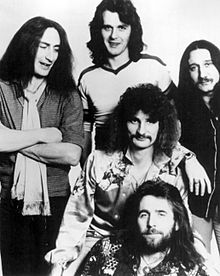The rest of the US tour was then canceled and their UK dates rescheduled to October. Soon after going out of hospital, Thain, in Sounds, openly accused manager Gerry Bron of having turned Uriah Heep into a mere "financial thing" and was fired two months after the group's final gig of 1974 at New Theatre in Oxford, England on 14 December. A year later, on 8 December 1975, Gary Thain was found dead in his Norwood Green home, having overdosed on heroin.
John Wetton (ex-Family and King Crimson) joined the band in March 1975 and with him Return to Fantasy (June 1975) was recorded; representing a revitalised Uriah Heep, it soared up to No. 7 in the UK. "It was a relief to have someone solid and reliable, and he had a load of ideas too," Box remembered. The following "Year-long world tour" (according to a headline in NME), was marred by a new accident. Mick Box fell off stage in Louisville, Kentucky on 2 August 1975, breaking the radial bone in his right arm (but he persevered through both the set and the tour, receiving three injections a night). On 26 March 1976 at Roy Wilkins Auditorium in St. Paul, Minnesota, John Wetton had an accident of his own when he (like his predecessor, Thain) received an electric shock on stage.
In November 1975 The Best of Uriah Heep compilation was released, preceded by two solo albums: Byron's debut Take No Prisoners and Hensley's second, Eager to Please.
High and Mighty followed in June 1976. It was considered lightweight; even Box stated: "less of the 'eavy and more of the 'umble" (making pointed reference to Uriah Heep's self-description as "'umble" in Dickens' David Copperfield).

Niciun comentariu:
Trimiteți un comentariu